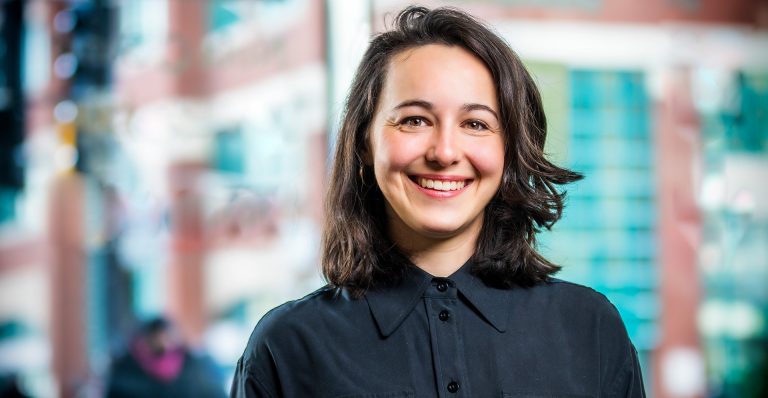Geneviève Grégoire-Labrecque wants to know more about how young people are engaging with society

How do we define youth participation in society and how do we measure it?
For Public Scholar and Individualized (INDI) program PhD candidate Geneviève Grégoire-Labrecque, the answers are related to how students respond to various social issues in school settings.
“Witnessing the passion and engagement of different youth energizes me,” she says. “How do we support them along the way to building more resilient, rights-based communities?”
A member of the Child Rights Academic Network and the Canadian Coalition for the Rights of Children, Grégoire-Labrecque has a background in anthropology and is also the recipient of Nelson Mandela and Joseph-Armand Bombardier graduate awards.
Her work is supported by the Social Sciences and Humanities Research Council of Canada (SSHRC).
‘It’s the starting point for a fairer world’
What inspired you to study child rights?
Geneviève Grégoire-Labrecque: My interest in children’s rights, and specifically children’s participation rights, comes from my childhood.
My life was split between family, school, day camps and health professionals. In these settings, I developed meaningful relationships with peers and mentors alike — as a child and a human being.
I thought it made sense for me to pursue in some way what I was given — to support children and youth in their everyday lives through engaged research.
What are some of the specific issues in child rights that you would like people to pay more attention to?
GGL: There are three main issues that I would like to flag in connection with my studies.
First — and this is not new — is that the implementation of children’s participation rights depends mostly on the adults in their lives. For instance, participation activities are often controlled by policymakers, practitioners and educators whose decisions are based on their own goals.
Second is that children’s rights are often not taught in school in Quebec and Canada. Is it because adults feel threatened by the topic or is it because of a lack of knowledge?
Finally, there’s the connection between children’s right to participation and children’s right to non-discrimination: Who are we listening to? Whose voices are put forward and/or amplified?
How do we measure levels of youth participation in a community?
GGL: That’s quite a complex question!
I’m interested in how youth participation is understood and experienced in school by youth and school staff. I think this depends on whose point of view is put forward. For example, is what the school provides actually considered meaningful participation by the students?
So far, what I have come to realize through my journey alongside children and youth is the importance of listening and having the humility to learn from youth, in all their diversity.
Are conditions improving for children and youth in Montreal, Quebec and across Canada?
GGL: The recent months have highlighted quite a big amount of inequality across Canada in terms of who has access to school, who is listened to and who is treated with dignity and respect.
At the same time, children and youth have been very active in speaking up against injustices and suggesting alternative ways to move forward in all domains.
So there is definitely space for improvement, but there is also hope sprouting locally and across the country.
It seems like the topic of child rights can be heavy at times. Does this research take an emotional toll on you?
GGL: There are very sad stories out there, of course, but there are also amazing and uplifting ones.
I would say that working on children’s rights is intimately connected to remembering that the child-rights framework is not neutral, even if there is this “morally good” aura around it. It is essential to remember that it is deeply rooted in Western liberal norms and all that comes with that.
In that sense, I see it as my duty to be kept on my toes, to be challenged, to stay humble, to try to listen carefully and to remember my positionality in all of this.
So, yes, it can be emotional to be shaken by other perspectives, but I believe it can only be a starting point for a fairer world.
Find out more about Concordia’s 2021-22 Public Scholars.
And watch Geneviève Grégoire-Labrecque in the online panel discussion Untangling the Blurry Lines of “Engaged” Research on October 12 from 9:30 to 11 a.m.


